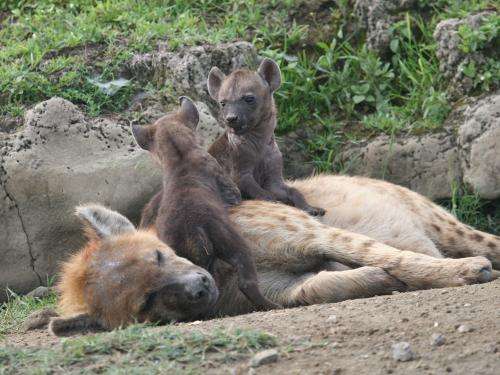High cost of lactation compromises immune processes in spotted hyenas

Scientists have demonstrated that in spotted hyenas, lactation increases the chance of parasite infection. The results have been published in the scientific journal Behavioural Ecology and Sociobiology.
Researchers revealed for the first time in a large carnivore that immune processes were compromised in lactating spotted hyena females, because they were more likely to be infected with hookworms and had higher hookworm burdens than non-lactating females. Mothers producing the larger volume of milk required by a twin litter had higher hookworm infections than those raising singleton litters.
Spotted hyenas are social carnivores which live in large communities ("clans") with a strict dominance hierarchy. Females in a high position have priority access to food. Therefore hookworm infection increased as female social status declined because of the far greater foraging effort of low status mothers that regularly must undertake frequent long-distance foraging trips.
Marion East and her colleagues from the German Leibniz Institute for Zoo and Wildlife Research (IZW) and researchers of the University of Cardiff in the UK investigated spotted hyenas in the Serengeti National Park in northern Tanzania using a non-invasive measure of parasite infection (i.e. hookworm eggs per gram faeces). Hookworms are common extracellular gastrointestinal parasites of mammals. Adult worms inhabit the small intestine, where they feed on their host's mucosa and blood. The extent of the pathology caused to the host increases with the number of adults hookworms present. The drain on host resources caused by parasite infection can lead to a decline in the host's body condition, thereby predisposing it to further infections.
Lactation is nutritionally the most costly component of reproduction in mammals. Spotted hyena milk has high energy content composed of mostly fat and protein. Cubs are entirely dependent on milk for approximately the first six months of life and may not be weaned until 18-20 months of age. Life-history theory predicts that to sustain lactation, mothers with insufficient food intake may have to reduce their resource allocation to other life processes, such as investment in immune processes. In spotted hyenas, concurrent infection with an opportunistic intracellular gut parasite (Cystoisosopora) increased as hookworm infection increased, providing further evidence of compromised immune processes.
More information: "Does lactation lead to resource allocation trade-offs in the spotted hyaena?" Beahv Ecol Sociobiol; DOI: 10.1007/s00265-015-1897-x
Journal information: Behavioural Ecology and Sociobiology
Provided by Forschungsverbund Berlin e.V. (FVB)



















